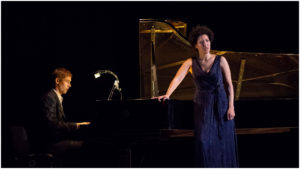
Lincoln Center White Light Festival 2019 Review: Zauberland
Julia Bullock Shines Through Nebulous Concept
By Logan MartellOn Tuesday, Oct 29, 2019, John Jay College was host to the New York premiere of “Zauberland,” which comes as part of Lincoln Center’s White Light Festival.
This new work follows an unnamed young woman, forced to leave her native Syria and seek refuge in Germany, where she tries to resume her career as an opera singer. Described as “An encounter with Schumann’s ‘Dichterliebe,’” this work revisits the story through the lens of the young woman, performed by Julia Bullock, leading into a number of new pieces by composer Bernard Foccroule.
Spending the entire time onstage, Julia Bullock demonstrated tremendous stamina as she sang and suffered immensely. It was commonplace for her to be forcibly dressed, undressed, shoved about, and even trafficked, at the hands of the ensemble representing the various figures exerting their will in her life. At some times even being treated like an object, Bullock never lacked for support or clarity with her wonderfully expressive soprano, able to channel an abundance of vocal and dramatic shades across the blurring states of life, memory, and imagination presented through the story; framing the events through the lens of a recital, the episodes of her life flow back and forth across the musical numbers
Shifting Works
Of the 19 new pieces Foccroule composed for this work, only two find a place during the sequence of Schumann’s “Dichterliebe,” with the remaining 17 following its conclusion. The shift between these works was established by the change in musical atmosphere, as it took on an atonal style, and language, as it went from German to English. Even during the “Dichterliebe” numbers, there were aspects of the modern influence either highlighting or subverting the original work in a number of ways. One early example came during “Im wunderschonen Monat Mai,” as Bullock is quickly blindfolded by the passing ensemble, leaving her to resume outlining the lied’s observational imagery with a simple, yet powerfully ironic, change.
While not having any lines, the four-person ensemble showed enormous adaptability as they revolved through different roles and constantly rearranged the set over the many numbers.
The pair of Ben Clifford and David Rawlins often played antagonistic parts, being responsible for much of Bullock’s unwilling costume changes, as well as perpetrating violence on Bullock’s ostensible younger self, played by Natasha Kafka. Clad in a white wedding gown, we see this figure threatened with a gun, thrown down, and even doused with gasoline; fixated on this vision of damaged purity, Bullock lies down on a bed; matching her position to the body of Kafka’s character, we see their connection visually reinforced.
Another notable figure was Raphael Zari as the woman’s lover, providing a target for her vocal affections and allowing her some brief happiness as they slow-danced while Bullock sang. Dying not long after, he returns at intervals throughout the show as her memories and dreams flow from one to the other.
Commanding Presence
Foccroule’s music served as something of a reflection of Bullock’s mental and emotional state, filled with jarring dissonant chords, or chromatic melodies that seemed to run away with themselves. With the atonal music, the heightened, metaphorical language of the text came only as a slightly more coherent expression of her inner turmoil. Bullock and pianist Cedric Tiberghien displayed great expertise in taking a cycle as commonly-performed as “Dichterliebe” and allowing the narrative to shade their performance with interesting nuances.
With as much as there is going on in the music, the directing and set command much of one’s attention due to the often shocking events unfolding, with the young woman not only at the mercy of other people, but of her surroundings as well, due to her experiences in a ravaged Aleppo coming back to haunt her. Given the constant rearranging of furniture and props on the set, the instances where sand seems to burst its way in from the war outside came as a strong visual reminder of the story’s volatile nature and structure.
“Zauberland” does much in the execution of its premise, with the performers knowing how to bring the most out of the evening’s performance and its material. Due to the show’s rather short run-time of 80 minutes, along with the constantly-changing numbers and scenes, there were more than a few instances where I found myself trying to keep up as the directions and music veered strongly towards an abstract approach, though others may have found it easier to follow.
While the structure of the story and new music are not completely tangible, “Zauberland” comes as a work that must be experienced rather than analyzed, with the staging and performance making for a gripping evening of musical drama.



